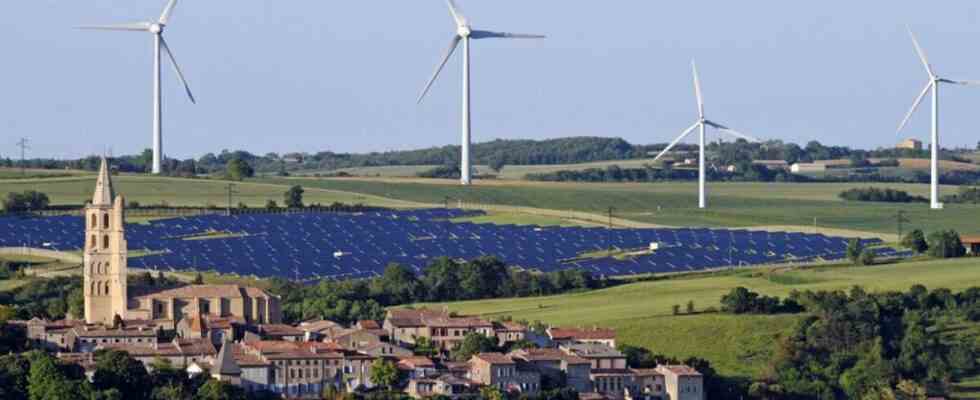Solar, hydraulic, wind, geothermal energy, wood energybiofuels… For two decades, the share renewable energies (ENR) in France’s final energy consumption has risen sharply. While they represented 9.3% in 2005 – or 180 terawatt hours (TWh) – it rose to 19.1% in 2020, or 322 TWh.
With what climatic and economic advantages? This is the question that has been pondered the Environment and Energy Management Agency (Ademe)in a report published on Wednesday on the sidelines of European meeting of the energy transitionin Geneva.
A substitution for fossil fuels
First contribution taken into account: that of imports of primary fossil energy that the deployment of renewable energies has made it possible to avoid. An imperative that is doubly relevant today as the climate emergency has been compounded by Europe’s desire to wean itself off Russian oil and gas since the invasion of Ukraine on February 24.
To measure this positive impact of renewable energies, David Marchal, deputy executive director of expertise and programs at Ademe, first invites you to bear in mind that they are not only used to produce electricity, as we sum it up too much often in the French debate. They also aim to produce renewable heat (geothermal, wood energy, for example), which reduces our consumption of gas and fuel oil, or to produce biofuels, which replace diesel and gasoline. These positive impacts go beyond the borders of France, “since the development of renewable energies in France makes it possible, thanks to our exports of biofuels and electricity, to participate in the decarbonisation of Europe”, indicates David Marchal.
In total, between 2000 and 2019, the deployment of renewable energies in France has made it possible to avoid the consumption of 1,468 terawatt-hours of primary energy (Twhep) from fossil fuels in France and Europe. Or the equivalent of 910 million barrels of oil in total, indicates Ademe. “It’s a little over half of a full year of primary energy consumption in France”, gives David Marchal as another comparison.
“A year of emissions in France avoided”
This lower consumption of fossil energy also has the advantage of avoiding greenhouse gas emissions. Here again, Ademe has released its calculator and estimates the gain at 426 million tonnes of CO2 equivalent (eq-CO2) between 2000 and 2019. “This represents around a year of emissions in France”, compares David Marchal. With a downside all the same that recognizes the study: the development of certain renewable energies can itself be a source of carbon emissions. This is the case, for example, of conventional biofuels, known as first generation, which come from cultivated plants. However, agriculture is not carbon neutral.
Despite everything, the climate balance of renewable energies remains “largely positive”, estimates Ademe. It comes with economic benefits, completes the study. The deployment of renewables between 2000 and 2019 thus generated a saving of 22 billion euros on the French energy bill, by making it possible to reduce fossil fuel imports. At the same time, over the same period, it has enabled us to increase our net energy exports by 18 billion euros, whether electricity or biofuels.
A dynamic to pursue?
Just a start? Via the Multiannual energy programming (PPE), France has set itself the goal of reaching a share of renewables of between 32 and 35% in 2028 in its gross final energy consumption. This involves going from 322 TWh in 2020 to between 477 and 529 TWH in six years. So big challenge. But if these objectives are respected, this would allow the French and European perimeter to avoid 685 TWhep of fossil fuel combustion and the emission of 169 million tonnes of CO2eq, points out Ademe. As well as reducing by 6.4 billion euros the French energy bill linked to fossil fuel imports. So many reasons to get started, for the study.

